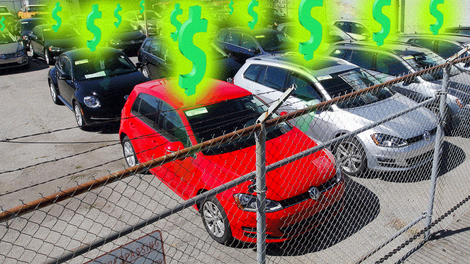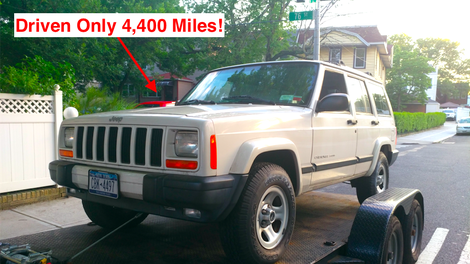
Yesterday, I wrote about a man who snagged a mint 4,400 mile-on-the-clock Jeep Cherokee from a 70-year-old woman for dirt cheap, only to try to flip it for $15,000. Some readers voiced their disdain, saying the man took advantage of the woman’s ignorance. So that brings us to a question: when is it wrong to flip cars for a profit?
This sort of question also came up when I highlighted the people buying up cheating Volkswagen TDIs with aims to later sell them to Volkswagen for major profits, so it’s about time we discuss it.
Do You Know Something The Seller Doesn’t?
Jay Leno recently featured on his show an MK1A Sunbeam Tiger, which the owner bought for $3,000, and which is now worth $112,000 (you can watch the clip here on CNBC). The current owner, Steve Hoffman, bought the Tiger MK1 from the desert from the original owner, after which Hoffman put about 50 large into fully restoring the little convertible. Now the car is worth big bucks, and if he wanted to, Steve could manage quite a lucrative “flip.”
Advertisement
Advertisement
The new owner put blood, sweat and tears (and also money) in, and now he stands to enjoy the fruits of his labor. All that seems A-OK by me.
On second thought, Hoffman originally paid only $3,000 for a car that was probably worth quite a bit more. Hagerty’s current valuation for a “fair” MK1A Sunbeam Tiger is $46,900. Chances are, the car was worth less when Steve bought it years ago, but let’s just say—for the sake of argument—the used car was worth $10,000 at the time, and Steve bought it for $3,000 from an owner who was stuck in 1960s-money and thought anything over $1,000 was considered beaucoup bucks.
Advertisement
If Steve knew the junky MK1 Sunbeam’s value at the time of purchase, and the seller did not, was this $3,000 purchase a morally OK transaction? Does the answer to this change if the car had actually been worth $46,900 at the time of purchase? What if it had been worth $200,000? Does the owner’s age or mental state factor in at all? Would the moral implications of the purchase change if Steve had offered the seller less than the already hilariously low asking price?
The Federal Trade Commission recently addressed hoarders who were buying up TDIs from owners unaware of how much their cars were worth, calling Volks-hoarders “unscrupulous.” Here’s the full text:
Potential buyers may offer what sounds like a good deal, but it’s still less than you can get for a buyback under the FTC’s settlement with VW. Whether it’s a private purchaser or an unscrupulous dealer, those buyers are just going to turn around and sell the car back to VW for more money through the court-approved buyback program.
Is the FTC in the right to calling these “flippers”—who profit from people who aren’t aware of their vehicle’s market value—unscrupulous?
Whether both parties understand a car’s value is often at the crux of the “Is it moral to flip?” question, but the seller’s understanding the vehicle’s condition is also a factor. After all, can you really understand a car’s value if you don’t truly understand its condition?
Advertisement
A good example is that Jeep Cherokee a reader named Matt offered to give me for free a few weeks back, because he thought the engine was blown. He knew full well what Jeep Cherokees were going for on the market (about $1,500 for a running junker, basically $0 for one with a blown engine)—that part wasn’t the issue. The issue was that Matt couldn’t put a proper valuation on his Jeep, because he didn’t know that it was actually in decent condition. I, however, did.
If I had chosen to remain mum about the fact that his Jeep could be brought to decent shape by simply tightening four flex plate bolts, and simply taken the free Jeep, I could have flipped it for a $1,500 profit. But would that have been OK?
Advertisement
As you know, I personally couldn’t do it. Just knowing that the only reason Matt was selling me the car for free was his lack of a tiny bit of information is what would have bothered me. Of course, I’m not saying everyone who’s about to buy a broken car for dirt cheap has to diagnose and tell the seller exactly what is wrong, and how easy it is to fix. But in my case, taking the Jeep—which could be fixed with so little effort—just didn’t feel right. Especially since Matt was a college student.
So to me, I think the answer to “Is it OK to flip a car?” depends on one thing: am I aware that the owner is missing a small parcel of information about the car’s condition or market value? If the answer is yes, and the sale price is substantially lower because of that ignorance, I would not feel right about flipping the car.
Advertisement
Advertisement
I should clarify that I’m not talking about what makes flipping a car legal, I’m talking about what makes it morally right—a much more nuanced and subjective topic. I know lots of folks will disagree with me, and say it’s the seller’s job to understand the car’s market value and condition, and that taking advantage of that ignorance is perfectly OK. Others might bring up the seller’s mental capacity as a critical part of this discussion: is the seller old, or in any way limited in their ability to decide upon a fair price? If they’re selling a $50,000 car for $5,000, can you assume there’s something a bit wrong upstairs? And still others might think that the morality of the flip depends on the dollar figure (i.e. how much the flipper stands to gain).
But for me, just taking advantage of ignorance makes me feel a sinking feeling inside.
















